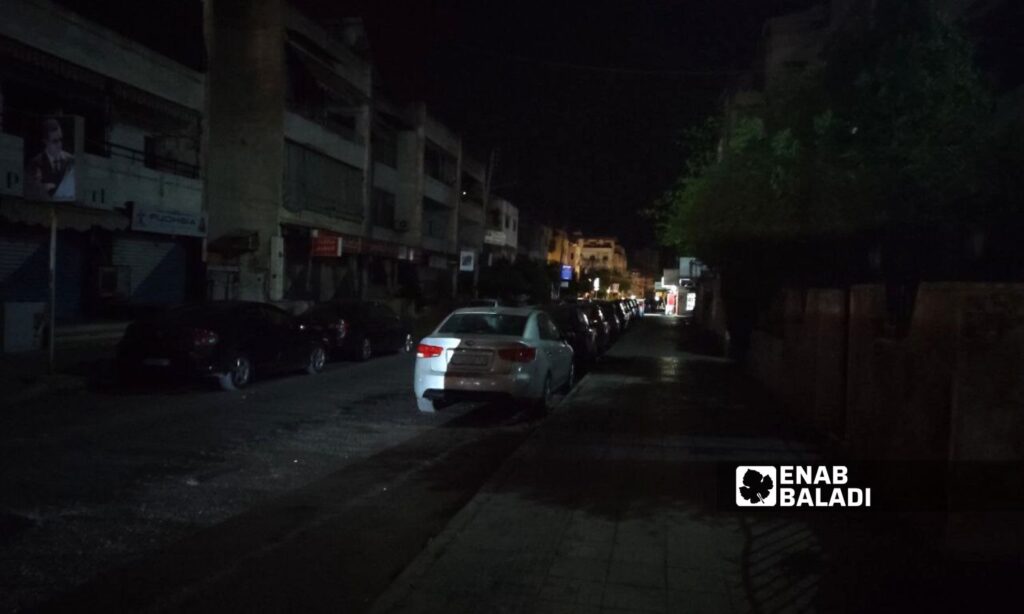The electricity situation in the provinces of Tartus and Latakia has deteriorated since April 15, with power cuts extending up to about 6 hours in exchange for half or a quarter hour of electricity in Tartus, and in Latakia, 5 hours of cuts in exchange for one hour of electricity per day.
This situation has increased the pressure on students preparing for secondary and preparatory exams as the brief periods of electricity are not enough to sufficiently charge batteries to illuminate homes for longer durations.
Samir (38 years old), a resident of the rural Dreikish area, said that electricity used to be available for one hour after 5 hours of rationing, before it dropped to just half or a quarter hour recently, with no fixed rationing schedule.
A quarter or half an hour is not enough to charge the batteries, or to cool and heat water, and a laundry load needs at least two days to finish, he noted.
Electricity is completely absent in the rural areas of Baniyas during the evening due to frequent faults, said Safaa (29 years old), a government employee living in rural Qadmous, mentioning that on May 2 and 3, the village had no power in the evening, although the weather was neither rainy nor stormy.
When villagers tried to lodge a complaint with the electricity emergency number, they received no response before the power eventually returned on the evening of May 4, lasting only a quarter of an hour.
Safaa described the situation as “unbearable,” especially with summer approaching and it being impossible to sleep inside homes without operating fans, which need at least a fully charged battery to run for an hour.
Slightly better in Latakia
The situation is slightly better in Latakia, where previously power rationing was four and a half hours off in exchange for one and a half hours of electricity, before dropping to just one hour after the Eid al-Fitr holiday (mid-April).
During the summer of 2023, the city of Jableh witnessed protests that nearly escalated into a large demonstration near the Mall square, demanding improvements in electricity supply that only lasted for fifteen minutes, leading to a significant water crisis caused by power rationing.
Authorities responded quickly for fear of escalation, and the Ministry of Electricity intervened to improve the energy situation, resulting in an electricity supply of an hour and a half in exchange for four and a half hours off.
In al-Hammam square in Latakia city, where Haider (35 years old) lives with his wife and child, the duration of electricity varies from day to day, sometimes lasting an hour, sometimes half an hour, and often three quarters of an hour (over six hours), unlike the situation in al-Zira’a neighborhood, where his colleague lives, receiving power for either an hour or hour and a half despite both neighborhoods being separated by no more than three kilometers.
The declining electricity situation has negatively affected most families, and according to Haider, what bothers them the most is charging phones and the laptop he needs for his private freelance work after his official work hours in the public sector.
He added that currently, his mobile phone’s charge does not exceed 40%, and he has to charge it along with his laptop at a grocery store that owns an “ampere” line to power the refrigerators.
The city of Latakia has been facing a household gas crisis since the first week of last March, with the duration of receiving a monthly gas notice now exceeding ninety days, and with the absence of electricity, there are currently no available alternatives.
The electricity rationing has increased across Syrian cities, with Hama receiving electricity for no more than a quarter of an hour at a time (5 to 6 hours of cuts), as is the case in Homs.
Electricity Minister Ghassan al-Zamel justified the poor state of electricity due to a shortage of supplies and expected the problem to end by mid-May with the arrival of supplies and the reactivation of halted units.

